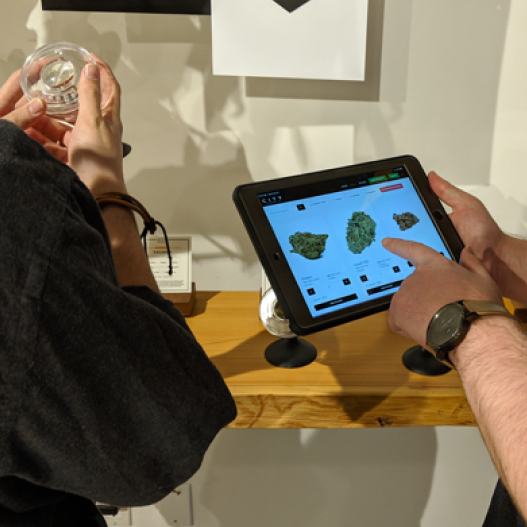Part 3: Interactive Menus, Express Checkout & CRM
*Part 1 of this blog series focuses on Cannabis POS systems, Part 2 on Digital Signage, and Part 3 on Interactive Menus, Express Checkout & CRM Systems.*
As any cannabis shop owner could tell you, setting up a cannabis business is no easy task. Most founders find themselves wearing several hats before their stores are even open, from raising funds, finding locations, managing licensing, overlooking renovations, and making technology decisions. Many retail companies don’t have a tremendous amount of experience when it comes to technology, and that can make the process of system selection seem daunting.
When making technology system decisions, there are two key questions businesses should ask themselves:
- How to select the best system for your business needs
- How to best utilize the system to increase your bottom line
INTERACTIVE MENUS & EXPRESS CHECKOUT
Due to the strict retail regulations in Canada, cannabis products are not physically accessible to the customer. Smell jars are often allowed, but many retailers are beginning to shy away from these as they tend to give very little information to users, and all display products need to be thrown out – not great considering there is already a product shortage.
Retailers are more often turning more towards interactive tools, such as tablet menus, which can help users learn about products at their own pace, and allow them to self-serve when staff members are busy with other customers. Many retailers are also leveraging tablets as a staff tool to enable them to have product information on-hand at all times and even create express checkout orders during interactions.
How to Select Interactive Menus & Express Checkout Systems:
The best interactive menu & express checkout systems will integrate directly into your POS system to allow real-time product availability, meaning that when you run out of specific product, it should pull off the menu automatically, and vice versa.
Product information management (PIM) is an often overlooked aspect of any digital system. Put simply, PIM is how product information or content is created, stored, and accessed by other systems. An interactive menu should have a simple way to either create, access product information from other sources or have product information built right in, and should be able to display content in a compelling and easy-to-understand format.
Lastly, you should make sure that this software runs on the hardware you’ve selected, whether that be iPads, Android tablets, or whatever else.
How to Best Utilize Interactive Menus & Express Checkout Systems:
Interactive menus become an impactful component of any cannabis retailer’s customer experience, so it’s essential to have a clear idea of how these systems will compliment your customer’s in-store shopping experience.
First, does it make sense to use an interactive menu for customers to use by themselves, for staff members to use, or both? If having a hands-on customer experience is important for your store, then it might make sense to arm your staff members with tablets that will help them deliver one-on-one sessions, and have all the necessary information on hand. If your customers prefer to browse or if your staff members tend to stay behind the counter, then it makes more sense to utilize the self-serve stations or kiosks. Many retailers find the sweet spot is in the middle, and having both options allows customers to choose their own experience.
CUSTOMER RELATIONSHIP MANAGEMENT (CRM) SYSTEMS
Customer relationship management is a term used across nearly every industry but means varied things depending on what kind of customer you’re dealing with – consumer, business, partners etc.
In cannabis retail, CRM means how your dispensary can obtain & manage useful customer information that can help your business deliver a better experience, features, or personally relevant information. Information that falls under this category includes personal information, purchase history, customer preferences, and more.
For example, some cannabis retailers are collecting customer emails so they can communicate with users while out-of-store, like a business newsletter. In Provinces where either order-ahead or delivery is available, it’s essential to be able to collect customer information, such as date-of-birth, or delivery address, to a customer account or profile – no one wants to have to answer the same questions over and over again.
How to Select a CRM:
Since customer data is sensitive information, perhaps the first question that should be asked is where that data is stored and is it secure? If that data is stored within Canada, that’s ideal, whereas data stored in the US is a risk for both the business and customer if it were to fall into the wrong hands.
Beyond this, it comes down to what kinds of information your business wants to collect, and why. If your business is going to send email communications, then obviously you need a system that can collect email addresses. Other information such as name, demographic data, address, or purchase history are also fair game as well, so if you plan to leverage this information, then it should be storable in your CRM.
How to Best Utilize a CRM:
The best cannabis CRM systems make it easy for staff members to collect information, or even better, for the customer to do it themselves. This goes back to a customer’s willingness to give their information to you in the first place, and many customers might feel uncomfortable if they’re asked for this information point-blank. A CRM that makes it easy and comfortable for customers to enter their information themselves, and even incentivizes this, is ideal for this reason.
HOW WE CAN HELP
Buddi offers tablet-based interactive menus, express checkout & CRM solutions that integrate with leading cannabis POS systems.
To learn more, book your free demo today at www.buddi.io, or email info@buddi.io.
